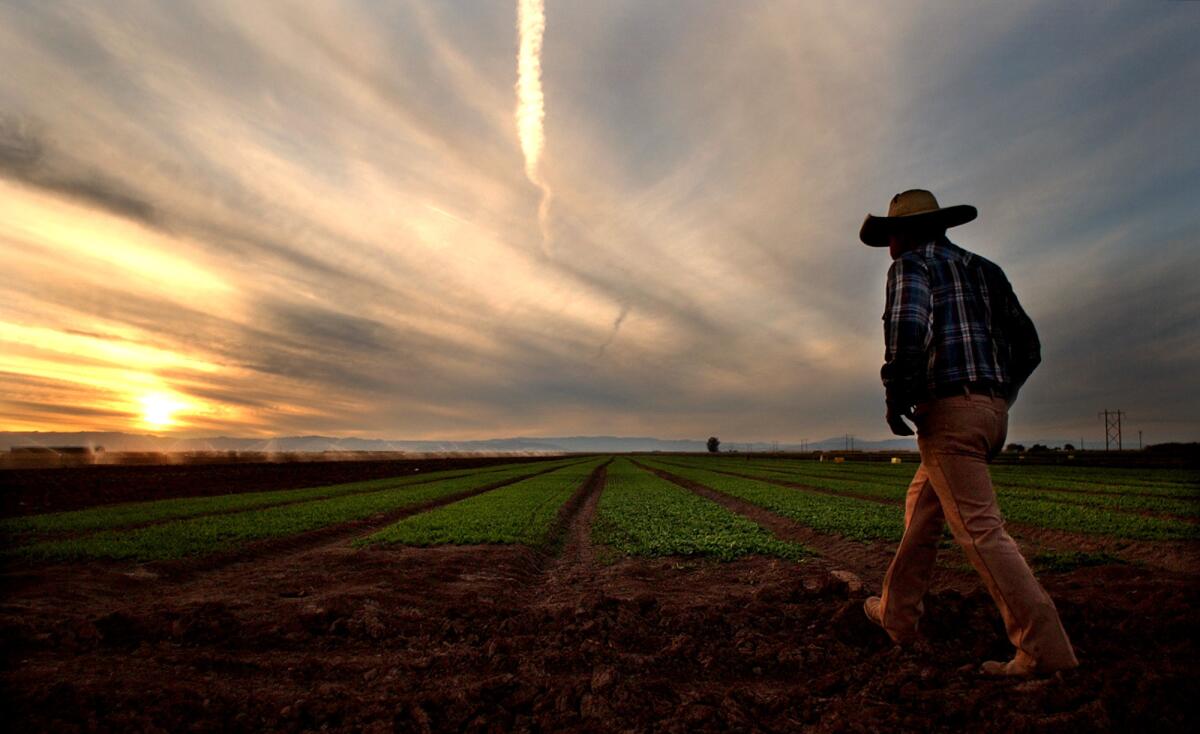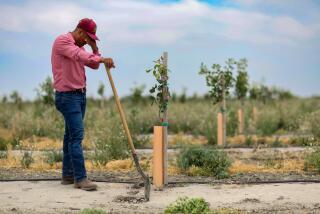Central Valley farmers unlikely to get federal water

- Share via
Central Valley farmers Friday got the bad news: Federal officials announced that most of them are likely to get no deliveries from the Valley’s big irrigation project this summer.
The U.S. Bureau of Reclamation’s initial assessment of how much water they can send to growers is always conservative. But as the state enters a fourth year of drought, reservoir storage remains below average and the depth of the snowpack is abysmal.
The bureau also must give top priority to senior water rights holders in the San Joaquin Valley, giving those growers water before delivering to more junior contractors.
Farmers were condemning the allocation even before it was officially announced, saying it will force them to idle more land this year and drive up unemployment in the Valley.
In 2014, growers left between 400,000 and 500,000 acres unplanted for lack of water, delivering a $2-billion blow to the state’s agricultural sector.
In the Central Valley, the move met with concern.
“This is not good,”said Ryan Jacobsen, executive director of the Fresno County Farm Bureau. “Last year was a struggle and now we’re dealing with the accumulative effect in year four of drought. As we move forward, we’re predicting this will be the most difficult year facing the San Joaquin Valley in 50 years.”
“The news is extremely disappointing,” said Dan Errotabere, a vegetable and nut farmer in Riverdale, 25 miles southwest of Fresno. “It’s frustrating that we’ll be fallowing the same or more land than last year. That equates to lost revenue, lost taxes and less employee hours. The effect on communities is real.”
The third-generation grower said he fallowed 35% of his land last year and plans to at least leave the same amount of land unplanted this year. The bulk of his water is being pumped from wells, which worries him because groundwater is sinking across swaths of the Central Valley.
His prime frustration, like many farmers, is that surface water accumulated by rain and snow is flowing to preserve endangered species rather than being channeled to farmland.
“The system should have more flexibility to deal with dry periods like this,” said Errotabere, 59. “Farmers, we live with drought. It’s the nature of the beast. But I guarantee that if power in the city was delivered the way water is for us, it would be completely different.”
Steve Arthur, a well driller based in Fresno, said the lack of surface water will likely increase orders for new or deeper wells. The vetran driller is so backed-up he can’t get to new orders for another eight-to-nine months.
“Farmers that have two-to-three wells on the books are asking me to do a couple more,” Arthur said. “We’re so busy we had to order another drill rig.”
The new rig, due in July at a cost of $1.3 million, will join the six currently in operation. Some are drilling as deep as 1,700 feet as the competition for groundwater increases.
“Farmers can’t survive forever without federal water,” Arthur said. “They can’t keep spending all their money on water wells. Something will come to an end sooner or later.”
Twitter: @boxall
More to Read
Sign up for Essential California
The most important California stories and recommendations in your inbox every morning.
You may occasionally receive promotional content from the Los Angeles Times.












